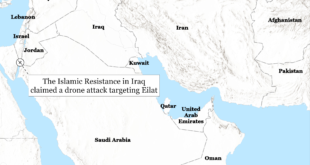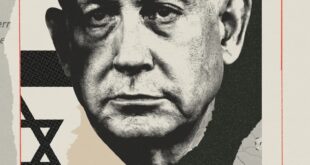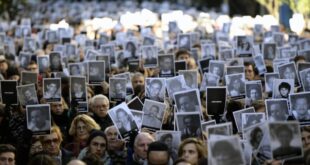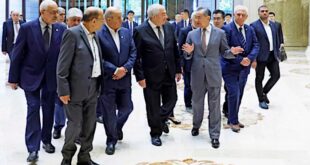 The U.N. nuclear watchdog on Wednesday put finishing touches on a report expected to confirm that Iran continues uranium enrichment activities, a finding that could trigger harsher U.N. Security Council sanctions against Tehran.Officials at the International Atomic Energy Agency said the report by Mohamed ElBaradei, head of the Vienna-based IAEA, would likely say that Iran has expanded enrichment efforts instead of freezing them.
The U.N. nuclear watchdog on Wednesday put finishing touches on a report expected to confirm that Iran continues uranium enrichment activities, a finding that could trigger harsher U.N. Security Council sanctions against Tehran.Officials at the International Atomic Energy Agency said the report by Mohamed ElBaradei, head of the Vienna-based IAEA, would likely say that Iran has expanded enrichment efforts instead of freezing them.
Once it is ready _ likely Wednesday but possibly Thursday _ the report will be sent to the agency’s 35-nation board and to the Security Council. The council set a 60-day deadline on Dec. 23 for such a freeze and said continued Iranian defiance past that ultimatum, which runs out Wednesday, could lead to sanctions additional to those it imposed last month.
Top Iranian officials showed no signs of compromise.
“The enemy is making a big mistake if it thinks it can thwart the will of the Iranian nation to achieve the peaceful use of nuclear technology,” Iranian state TV’s Web site quoted President Mahmoud Ahmadinejad as saying Wednesday.
On Tuesday, he said his country was ready to stop its enrichment program, but only if Western nations do the same _ something the United States and others with similar programs are unlikely to even consider.
“Do you believe that’s a serious offer?” White House press secretary Tony Snow asked. “It’s pretty clear that the international community has said to the Iranians, `You can have nuclear power but we don’t want you to have the ability to build nuclear weapons.’ And that is an offer we continue to make.”
Calls for talks _ voiced separately on Tuesday by Ahmadinejad, Foreign Minister Manouchehr Mottaki and senior nuclear negotiator Ali Larijani _ suggested an attempt to convey flexibility on the eve of the deadline.
Mottaki, in Turkey, said talks on the nuclear dispute should try to achieve an agreement allowing “Iran to achieve its rights” while eliminating “concerns” about its nuclear ambitions. Larijani, in Vienna, said his country was “looking for ways and means to start negotiations.”
But the officials did not offer what the Security Council is demanding _ an immediate and unconditional stop to enrichment. Iran has long insisted that it will not stop its nuclear activities as a condition for negotiations to start.
The United States and its allies suspect that Iran is using its nuclear program to produce an atomic weapon _ charges Iran denies, saying its aim is to generate electricity. Enriched to a low level, uranium is used to produce nuclear fuel but further enrichment makes it suitable for use in building an atomic bomb.
While telling reporters his country was prepared to deliver “assurances that there would be no deviation … toward a nuclear weapons program,” Larijani offered no new suggestions _ and indirectly ruled out suspending enrichment, saying that was just a “pretext” to put political pressure on his country.
Larijani was even more direct in rejecting an enrichment freeze as a precondition for negotiations in talks with ElBaradei, according to diplomats familiar with the substance of their conversation.
“He ruled out suspension and said Iran was not afraid of (U.N.) sanctions,” one of the diplomats told The Associated Press, speaking on condition of anonymity because his information was confidential. The diplomat said Larijani told ElBaradei that Iran could consider an enrichment freeze only as a result of talks _ and not before sitting down at the negotiating table.
Iran has rejected the Security Council resolution as “illegal,” and said it would not give up its right to enrich under the Nuclear Nonproliferation Treaty.
Still, no sanctions were expected immediately.
Discussions on a new resolution aimed at stepping up pressure on Iran to suspend enrichment are expected to start next week, a Security Council diplomat said in New York, speaking on condition of anonymity because of the sensitivity of the issue.
The council debate will focus on what new nonmilitary sanctions to include in a resolution, the European diplomat said. Possible new sanctions could include a travel ban against individuals on the U.N. list, an expansion of the list, economic measures such as a ban on export guarantees to Iran, and an expansion of the nuclear embargo to an arms embargo, the council diplomat said.
But Russia and China, both veto-holding council members with close ties to Iran, are likely to oppose economic sanctions or weapons bans. A travel ban was dropped from the initial resolution because of Moscow’s opposition, so tough negotiations are expected, the diplomat said.
Striking a combative note after meeting ElBaradei, Larijani warned the United States against opting for force instead of negotiations over the issue of enrichment.
“If they … move into the boxing ring, they would have problems,” Larijani told reporters in response to a question about U.S. pressure on Iran to give up enrichment. “But if they sit at the chess table, then both sides would come to a result.”
With the U.S. recently moving against Iranians whom it accuses of helping Shiite militias in Iraq and beefing up its naval presence in the Persian Gulf, Larijani’s comments were seen as veiled warnings that any additional U.S. weight on his country would be met in kind.
 Eurasia Press & News
Eurasia Press & News



